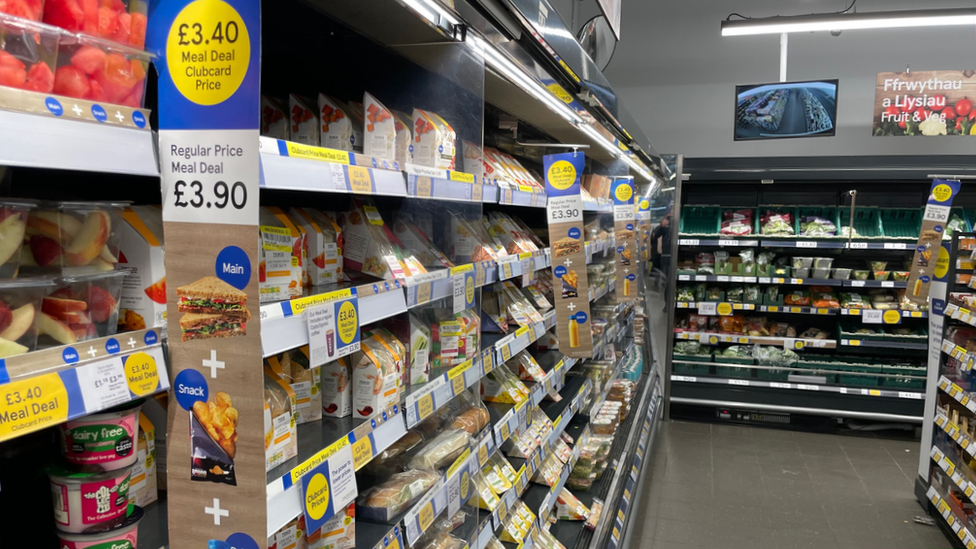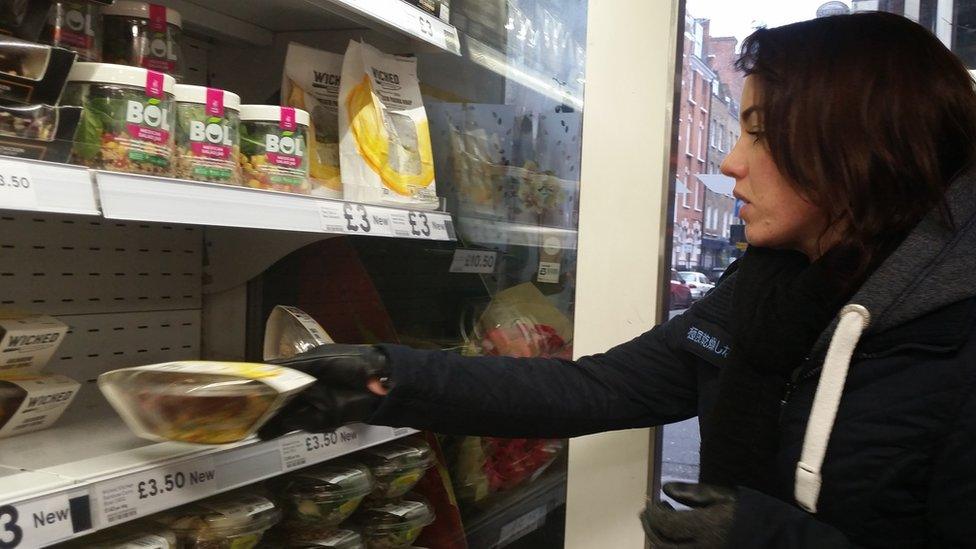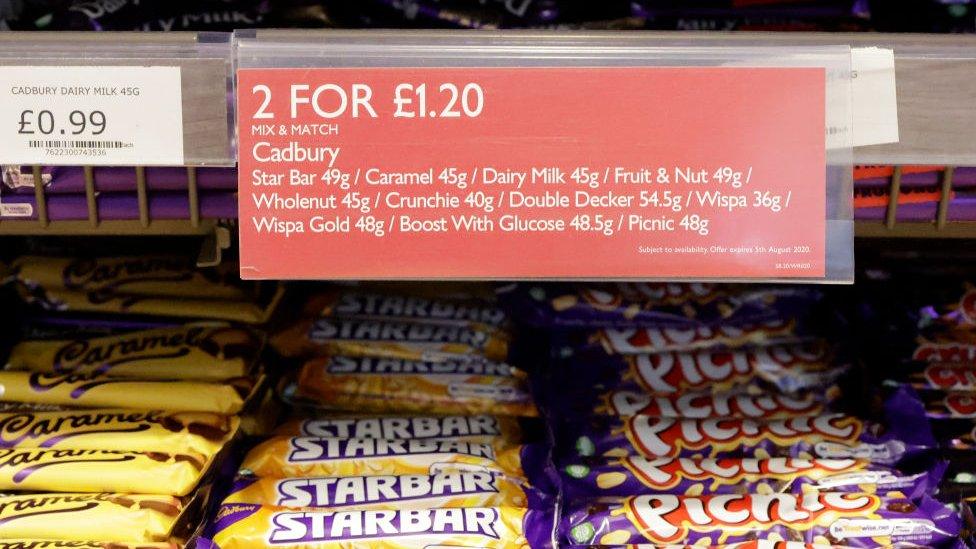Junk food: Wales may ban unhealthy meal deals to tackle obesity
- Published

Conor McAdams and Rhys Stringer say they would be "lost" without meal deals
Unhealthy meal deals and multi-buy offers could be banned in a new Welsh government move to tackle obesity.
While the legislation is aimed at promoting healthier food options, the Welsh Retail Consortium warned it could reduce choice and increase prices.
The Welsh government said it has consulted widely with industry representatives.
However, as people grapple with a cost of living crisis, people in Cardiff voiced their opposition.
"We are considering the next steps on price promotions and locations and no final position has been made following the public consultation," a government spokeswoman said.
"We are not proposing to ban meal deals themselves but to consider whether there should be restrictions on high fat, salt and sugar products, that may be part of a meal deal."
"Without meal deals, I would be lost," said Conor McAdams, 22.
"There are plenty of healthy options, it's down to the individual if they get crisps or fruit.
"A meal deal is convenient and cheap. It's the stupidest idea I've heard."
In the original consultation document, the bans being considered are temporary price reductions, multi-buy offers, and meal deals.
There have been suggestions in the proposal that meal deals should be exempt from the ban, but the Welsh government said no specific plans have yet been made following the consultation closure.
Rhys Stringer, 24, said: "I love a meal deal, and it's healthier than a McDonalds or a KFC."

Dan Hegarty says the idea of banning meal deals is "ridiculous"
Asha Begum, 25, from Cardiff Bay, said: "I think meal deals are a good thing because it's cheap - you can get three things for the price of one.
"Money is a big thing."
Dan Hegarty, 45, added: "I would say it's a little ridiculous. We live in a city where there is a Greggs on every corner. All the prices are going up, so if you can get a lunch for £3 or £3.50, I don't see why not. Meal deals are not the obesity choice."

Builders Lewis Burr and Barrie Griffiths say meal deals are a "handy" option
Builders Lewis Burr, 26, and Barrie Griffiths, 78, said meal deals are a "handy" option for people in their line of work, but that if they were banned they would buy the same products anyway.
Cary Frame, 28, added: "There's a lot of people in a rush who need to pick up a meal. It's not a good idea."

Cary Frame, 28, says meal deals suit "people in a rush"
Patricia Quick, from Barry, said that while she does not buy them, she thinks it is about moderation.
The 67-year-old added: "It all depends if you're having a meal deal every single day, which some people do. There is a lot of obesity, and we should watch what we are giving our children.
"But even I look round for the cheapest things going. So it's keeping prices down, but making sure people don't overindulge children."

Shop owner Shelley Brown says she would rather make all products as cheap as possible, than promote certain ones with deals
Shelley Brown, owner of Duke's newsagents in Ruthin, Denbighshire, said she does not offer meal deals because she wants to sell all her products as cheaply as possible, rather than promote particular ones.
"If they made the product more healthy for people, I think it'd be a better way to do it," she said.

Helen Roberts says meal deals don't offer enough healthy options for her
Helen Roberts, 65, from Ruthin added: "I think it's just a selling technique. There's not enough healthy options for me, so I'm not a fan."
Sara Jones, head of the consortium, told BBC Radio Wales Breakfast members could get behind some of the proposals, such as multi-buy bans.
"We do understand the real importance of the government trying to tackle obesity and support public health," she said.
But she said banning meal deals and seasonal promotions would have a "disproportionate" impact on producers in comparison to the health benefits.
"People like myself, a busy mum of two, I am looking for a quick lunch option.
"I'm not going to over-consume because of those purchasing decisions and by banning those it will just lead to restrictions in terms of availability and affordability in terms of the consumer," she said.
'Regressive and irresponsible'
Promotions allow competition between retailers to attract customers, which helps keep prices down, she said.
"With inflation running at a 18-year high it would be regressive and irresponsible to put up costs in this manner with no evidence at this time that it would significantly improve public health."

Business leaders say they could support the ban on multi-buy offers
David Thomson, of the Food and Drink Federation Cymru, said: "The Welsh government must ensure that any policy does not increase the cost of food for the people of Wales at a time when households across the country are struggling to make ends meet.
"In addition, it is critical that Welsh food and drink manufacturers have a level playing field with their competitors in other parts of the UK."
James Lowman, chief executive of the Association of Convenience Stores, said the proposed rules were "unnecessarily inconsistent" with those already agreed in England.
He said this would put "additional pressure on retailers to start from scratch on store layouts at the cost of thousands of pounds".
A Welsh government spokesperson said the proposals are designed to support long-term health and wellbeing.
"We have been discussing these with industry representatives and have consulted widely. We are considering the next steps on price promotions and locations.
"The cost of living crisis will be given careful consideration in our decision making, alongside the significant impact obesity has on people's health.
"Any specific measures will be designed to promote healthier foods and reduce health inequalities and premature deaths."

FOOD FEST WALES: A culinary tour of Wales is on the menu!
ICONIC WELSH PEOPLE, PLACES AND THINGS: Kiri Pritchard-McLean unearths the best bits from the BBC Wales archive

- Published21 October 2022

- Published14 May 2022
